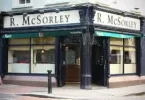Night-Time Economy Taskforce report published

The proposed major reform of the licensing laws will support the culture and hospitality sectors and modernise and diversify the Night-Time Economy offering.
The Report contains 36 proposed actions across a range of government departments, agencies and the Night-Time Economy sector itself and it covers a number of initiatives and pilot projects including:
- working with vintners and other stakeholders to develop a new Scheme to revitalise nightlife across the country and provide opportunities to artists in the community
- as outlined in Justice Plan 2021, the modernisation of the licensing regime by the Department of Justice to support the culture, hospitality and nightclub sectors and modernise and expand the Night-Time Economy offering
- piloting six new “Night-time Economy Advisors” in six cities and towns to develop new Night-Time Economy opportunities
- immediate review of noise regulation to ensure better co-ordination in the management of noise for residents, venues and authorities
- improved transport options with proposed new 24-hour routes
- the extension of opening hours in the national cultural institutions and the development of new pilot projects for late-night activity
- better planning and co-ordination to ensure public safety in the Night-Time Economy
- new best practice planning guidance for local authorities to ensure that nightlife and culture are embedded into the planning process
- facilitate arts and cultural/event spaces to work together and facilitate more use of publicly-owned cultural buildings and heritage sites for night-time events
- an examination of the practical implications of ‘meanwhile use’ for planning and other legislative codes to enable the potential for buildings to be used for Night-Time Economy activities.
- a new night-time food initiative in Cork with a focus on delivering an authentic local food experience.
The Report also recommends bringing more venues into late-night use by linking promoters and artists with existing spaces through a new annual exchange forum, the new late-night pilot programme for Culture Night.
It recommends increased collaboration across Government to deliver a high-impact and well-functioning public realm to encourage more outdoor activities in the Night-Time Economy and new guidance to be developed to help local authorities plan for a more effective and vibrant Night-Time Economy.
The proposed major reform of the licensing laws will support the culture and hospitality sectors and modernise and diversify the Night-Time Economy offering.
In the interim it’s proposed that measures to ease pressure on businesses including the review of SEO fees will be examined.
The proposals suggest eight new 24-hour routes be introduced in Dublin City and additional Night-Time Economy services be introduced in rural areas.
It’s also proposed that safeguards be put in place to protect women and other vulnerable people engaged in Night-Time Economy activities.
The Taskforce Report also proposes to increase the capacity for outdoor dining and entertainment.
Night-Time Economy Taskforce
The Taskforce itself comprised a wide range of government departments and agencies, the Lord Mayor of Dublin and Cork and ‘Give Us The Night’.
It examined a broad range of challenges facing the development of a vibrant night-time culture and economy including regulations, licensing laws, transport and the diversity of cultural activities as well as committing itself to find practical solutions to help our cities, towns and villages find and develop new opportunities.
It conducted an intensive stakeholder engagement process with relevant sectors and interested parties who’ve a significant role in the Night-Time Economy and Culture to ensure that all views and ideas were considered. This Report is the outcome of those consultations and it looks at ways to reignite the Night-Time Economy and culture “especially so given the devastating effects of the pandemic on live and arts events,” said Minister Catherine Martin in launching the report.
“Improving night-time life for audiences, venues and performers will help our recovery,” she said, “But there’s an opportunity to enrich our night-time life with new options, positioning us alongside other countries where a myriad of offerings await patrons after dark.
“It’s important that we protect and sustain this part of our economy – particularly as we emerge out of the pandemic. I see the actions in this Taskforce report as part of that wider discussion around overcoming obstacles which exist and creating opportunities for a more vibrant nightlife in our cities and towns. I will work with colleagues to deliver on these and we have to look at this Report as a starting point for the future development of the Night-Time Economy and Culture – not the end-point.
“The electronic music and nightclub sector is an integral part of the Night-Time Economy and our culture and it’s important that it’s supported and recognised,” she continued, “I understand the frustration, as it has been one of the hardest-hit during this pandemic, but I hope this Report will be a welcome step forward as we reopen in line with public health guidance.
“The advice that was published by Government on 31 August set out a roadmap for the recovery of live entertainment through September and October. In this context, I’m also delighted to announce today that a pilot nightclub event will take place on 30th September in The Button Factory in Temple Bar and I hope that the learnings from this will help the sector as we head towards a full easing of restrictions in October.”
Pilot nightclub event
The event will help develop a safe template and pilot the logistics of event-ticketing, venue admittance, the impact of antigen testing, ventilation and monitoring to ensure a safe and financially-sustainable return to indoor events.
There will be 450 people attending – 60% of the venue’s maximum capacity – and attendees must, according to current guidelines, produce a Digital Covid Certificate. Antigen testing will also be required and will be carried out close to the venue.
“There are also solid building blocks in this Report” continued the Minister, “in the area of planning, for example, I and my colleagues Minister O’Brien and Minister of State Burke in the Department of Housing, Local Government and Heritage are committed to hosting a workshop with the sector and other key departments and agencies to discuss solutions from this report.”
Modernisation of licensing law
The Minister of State at the Department of Justice with special responsibility for Civil and Criminal Justice, Hildegarde Naughton TD, also spoke at yesterday’s launch on the proposed modernisation of licensing as outlined by Minister Helen McEntee in Justice Plan 2021.
“My Department has been actively engaged with the Night-Time Economy Taskforce looking at innovative approaches to support and develop a vibrant, diverse night-time culture and economy in Ireland,” said Minister Hildegarde Naughton, “Reforming and modernising our licensing law is an important part of how we do that. Some of our licensing laws date as far back as 1833 and need to be modernised and reformed to reflect the economy and society of today.
“Today Government has approved the drafting of the General Scheme of a Sale of Alcohol Bill 2021, delivering on the commitments we set in the Justice Plan 2021 and the Programme for Government. The outdated Licensing Acts, Registration of Clubs Acts and the Public Dance Hall Act 1935 will all be repealed and replaced with updated and streamlined 21st Century provisions relating to the sale, supply and consumption of alcohol in licensed premises and registered clubs. This will radically reform, streamline and simplify our licensing laws.
“I am determined that this reform will be developed with a supportive approach to businesses and the interests of public health, consumers and communities will be central to its implementation.“
‘Give Us the Night’
Sunil Sharpe of Give Us the Night, who also spoke at the launch, described the Report as “the beginning of a rebirth for domestic nightlife”.
He said, “The publishing of this Report is an important milestone on the road to change for the Irish night-time industry. It has been a challenging process at times but we are happy with the direction it’s going and have particularly enjoyed our engagement with the Department and Minister Martin, who’ve taken time to understand and really try to address the issues at hand”.
He believed that the development, “if done right”, can increase the public’s interaction with their local city or town and open up new opportunities for a considerable part of the community.
“Ireland still does some of the basics well” he said, “but from a culture and entertainment point-of-view, has been running very dry in recent years at night to the point where we have seen the complete disappearance of venues and events in many parts of the country.
“The night-time industry should work for all businesses and venues and obstacles to this need be removed. That won’t all be done overnight and there are still many challenges ahead that all need careful attention.
“I believe we can meet all these challenges head-on and get them right. Nightlife can work for everyone, it will just take some extra work, determination and a bit of compromise here and there too.
“The main thing is that we create a more organised modern model on a par with our European counterparts and who knows – maybe even a bit better than some of them.
“The changes we need to make in Ireland will not be extreme, they will simply just mean doing things a bit differently, being a bit more flexible and ultimately placing a bit more trust in night-time businesses, venues, performers, workers and the general public. We need Ireland to be a desirable destination for tourists, sure, but enhancing the quality of nightlife for those who live here must be a top priority,” he concluded.








